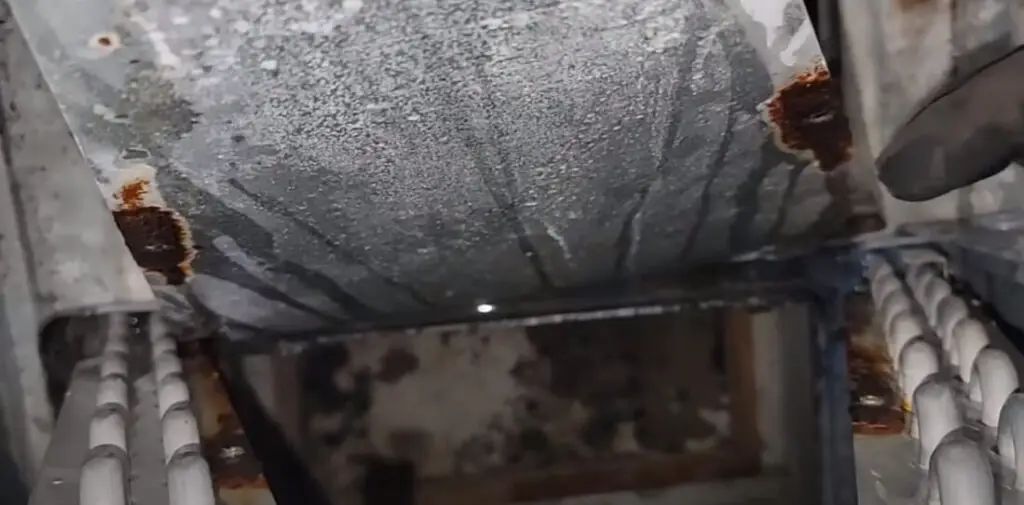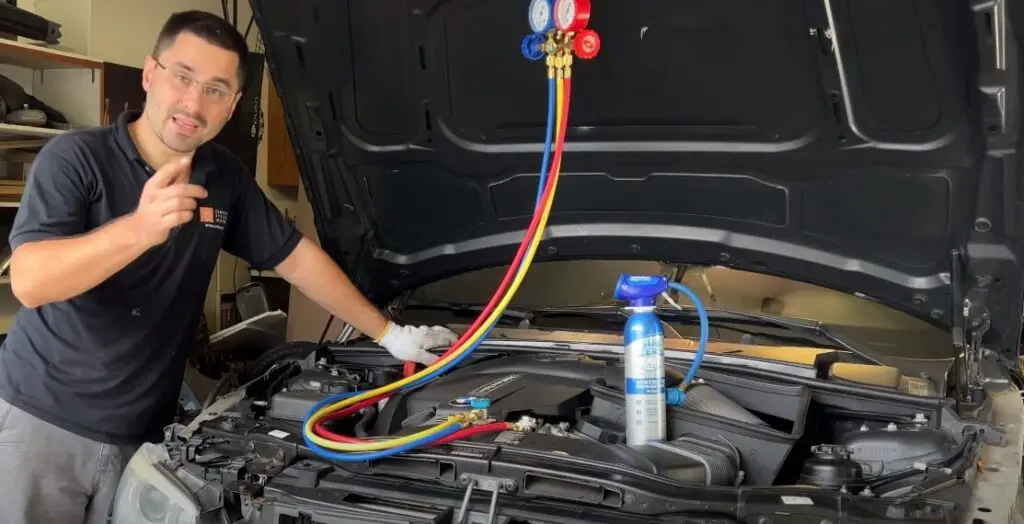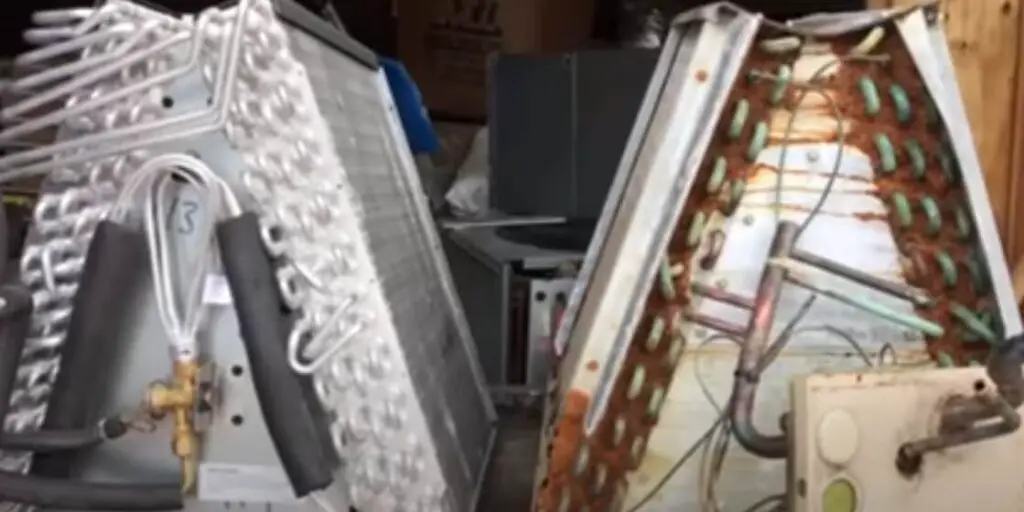If your air conditioner is leaking Freon, it’s not going to be a good summer. Freon is the cooling agent in your AC unit and without it, your home is going to get hot very quickly. There are a few things that could be causing your AC unit to leak Freon and we’re here to help you figure out what’s going on.
One of the most common reasons for an AC unit to start leaking Freon is because of a problem with the evaporator coils. These coils are responsible for absorbing heat from inside your home and if they’re not working properly, the Freon can start to leak.
Another possibility is that there’s a hole or crack in one of the hoses or pipes that carries the Freon.
Even a small hole can cause a big leak, so it’s important to check all of the hoses and pipes for any damage.

How Do I Know If My Ac is Leaking Freon?
If your AC is leaking freon, you’ll likely notice a drop in cooling performance. Your AC may also make strange noises, and you may see ice or frost on the coils. So you can easily understand your AC need freon right now!
Is It Normal for Ac to Leak Freon?
Yes, it is normal for AC units to leak freon. Freon is a refrigerant that helps to cool the air in your home. Over time, the freon can leak out of the unit and will need to be replaced.
You can purchase a replacement kit at your local hardware store or online.
Where Do Air Conditioners Leak Freon?
An air conditioner may leak freon for a number of reasons. The most common reason is that there is a hole or crack in the AC unit itself. In some cases, the AC unit may not be properly sealed, which can also cause a leak.
If your air conditioner is leaking freon, you should have it checked by a professional as soon as possible to avoid further damage.
What Causes an Air Conditioner to Lose Freon?

Over time, Freon® leaks out of air conditioners through normal use. The amount of Freon in an air conditioner is regulated by the U.S. Environmental Protection Agency (EPA) to help protect the Earth’s ozone layer. When an air conditioner loses a significant amount of Freon, it needs to be recharged or replaced.
There are several reasons why your air conditioner may be losing Freon:
1) Poorly sealed system: Over time, seals and gaskets can degrade, allowing Freon to escape. This is especially common in older units that have not been properly maintained.
2) Loose connections: If any of the connections in your AC unit are loose, it could allow Freon to leak out. Make sure all connections are tight and secure before using your AC unit.
3) Cracks or damage: If there are any cracks or damage in your AC unit, this could also cause a Freon leak.
Inspect your unit regularly for any signs of wear and tear and have any repairs done as soon as possible.
4) Refrigerant overcharge: If too much refrigerant is added to your AC unit, it can cause pressure to build up, leading to leaks.
Be sure to follow the manufacturer’s instructions carefully when adding refrigerant to avoid this problem.
What Happens When Freon Leaks from Air Conditioner?
When Freon (refrigerant) leaks from an air conditioner, several consequences can occur:
- Reduced cooling capacity: Freon is responsible for absorbing heat from the air inside the air conditioner and releasing it outside. When there is a leak, the refrigerant level decreases, leading to a reduced cooling capacity. The air conditioner may struggle to cool the space effectively or may not cool at all.
- Inefficient operation: A Freon leak can cause the air conditioner to run inefficiently. The system may need to work harder and for longer periods to achieve the desired temperature, resulting in increased energy consumption and higher utility bills.
- Potential damage to the compressor: The compressor is a vital component of the air conditioning system. When the refrigerant level is low due to a leak, the compressor may run at higher temperatures and experience strain. This can lead to compressor damage, which is a costly repair.
- Health risks: As mentioned earlier, Freon leaks can pose health risks. Inhaling Freon can cause respiratory irritation, dizziness, headaches, nausea, and other symptoms. Prolonged exposure to Freon can have more severe health effects, so it’s crucial to address the leak promptly and avoid inhalation of the refrigerant.
- Environmental impact: Some refrigerants, including older types like R-22 (Freon-22), have negative environmental impacts due to their ozone-depleting and high global warming potential. Freon leaks contribute to the release of these harmful substances into the atmosphere, exacerbating environmental concerns.
Can a car lose freon without a leak?
No, a car cannot lose Freon (refrigerant) without a leak. Freon is a closed system within the air conditioning (A/C) system of a car. If the Freon level is decreasing, it indicates that there is a leak somewhere in the system. The A/C system is designed to be a sealed system, which means that the refrigerant should not escape under normal circumstances.

If you notice a decrease in the Freon level in your car’s A/C system, it is important to have it inspected and repaired by a qualified technician. They can locate the source of the leak, repair it, and then recharge the A/C system with the appropriate amount of refrigerant.
Can a freon leak make you sick?
Yes, a Freon (refrigerant) leak can potentially make you sick. Freon is a type of chemical refrigerant that is commonly used in cooling systems, including air conditioners. When a leak occurs and Freon is released into the air, it can have harmful effects on human health if inhaled or if there is prolonged exposure.
The specific health effects of Freon exposure can vary depending on the type of Freon involved, the concentration of the leak, and the duration of exposure.
Can You Fix a Freon Leak in Air Conditioner?
Most people think that a Freon leak in their air conditioner is the end of the world. However, there are ways that you can fix this problem without having to replace your entire AC unit. Here are a few tips on how to fix a Freon leak in your air conditioner:
1. Check for leaks. The first step is to check for any leaks in your AC unit. You can do this by looking for any wet or oily spots around the unit. If you find any leaks, you’ll need to repair them before proceeding.
2. Add more Freon. Once you’ve repaired any leaks, you’ll need to add more Freon to your AC unit. You can do this by attaching a charging hose to the low pressure side of your AC unit and adding Freon until the pressure reaches the proper levels.
3. Test the repairs. After you’ve added more Freon, it’s important to test the repairs by turning on your AC unit and letting it run for a while.
If everything seems to be working properly, then your repairs were successful!
Air Conditioner Freon Leak Symptoms
If your car’s air conditioner is leaking, it’s likely that the Freon is also leaking. Freon is a refrigerant used in HVAC systems to keep things cool. If there’s a leak, you’ll probably notice some of these symptoms:
The air conditioner isn’t blowing cold air. This is the most obvious symptom of a problem. If your AC used to blow cold air but now it doesn’t, it’s likely that there’s a leak somewhere.
There’s moisture around the AC unit. Another symptom of a Freon leak is moisture around the AC unit. This could be water dripping from the unit or condensation on the outside of the unit.
Either way, it’s an indication that something isn’t right. The AC smells bad. If your AC starts to smell bad, it could be because of a Freon leak.
The refrigerant can cause an odd smell when it leaks out, so if you notice this symptom, it’s definitely worth investigating further. If you notice any of these symptoms, it’s important to get your AC checked out as soon as possible.
A Freon leak can cause all sorts of problems, so it’s best to catch it early and get it fixed before things get worse!
Air Conditioner FREON LEAK SYMPTOMS (Why is Freon Expensive?)
Does Freon Evaporate When It Leaks?
Yes, when Freon (refrigerant) leaks from an air conditioning system, it can evaporate into the surrounding atmosphere. Freon is a volatile liquid at room temperature and atmospheric pressure. When it escapes from a leak in the A/C system, it rapidly transitions from a liquid to a gas, a process known as evaporation.

The evaporation of Freon occurs due to the pressure difference between the A/C system, where the refrigerant is under high pressure, and the ambient air, which is at lower pressure. As the refrigerant escapes, it expands and undergoes a phase change from liquid to gas. This gaseous form of Freon can then disperse into the surrounding air.
It’s important to note that Freon is heavier than air, so it tends to sink and accumulate in low-lying areas. This can be a safety concern, as the concentration of the refrigerant may increase in confined spaces, potentially leading to health risks or asphyxiation if ventilation is inadequate.
Conclusion
If your air conditioner is leaking Freon, it’s important to act quickly. Freon is a refrigerant that helps keep your AC cool, and if it leaks, your AC won’t be able to do its job properly. There are a few ways to tell if your AC is leaking Freon, including listening for a hissing sound or looking for an oily residue around the AC unit.
If you think your AC is leaking Freon, call a professional for help.
Lately, I’ve been noticing a strange-colored liquid leaking from my air conditioner. Getting something like that checked might be a good idea for us if we want to utilize that appliance as much as possible during this hot season. I’ll look into this for sure when I find an HVAC expert in the area that can help us with some maintenance.